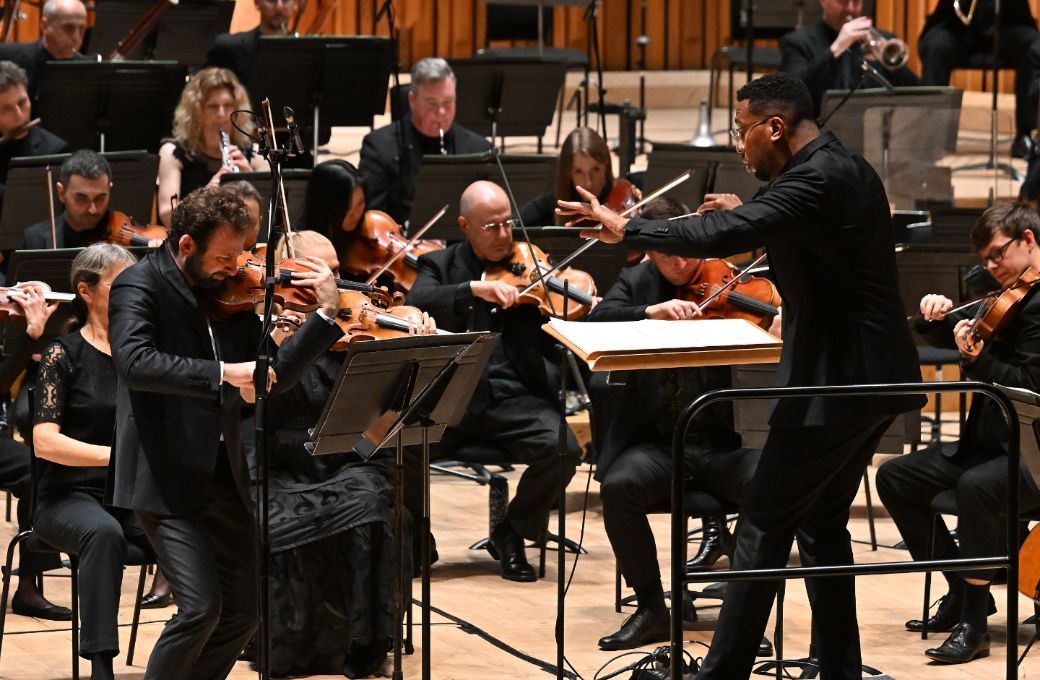Billed as “The Faun and the Firebird”, this superb BBC Symphony Orchestra concert could easily have had a title about war, and the pity of war. The fantasies of Debussy and Stravinsky formed the outer panels to a polyptych enclosing a new violin concerto by Finnish composer Lotta Wennäkoski, and a welcome visit of a symphonic ballad of Ukrainian Boris Lyatoshinsky. Pacifist sentiments by Russian poet Marina Tsvetayeva coloured the concerto, and the death of a female warrior in battle haunts the ballad. This unusual programming proved a winning formula through the magnificent playing of the orchestra, the sublime artistry of Ilya Gringolts, and the revelatory conducting of Roderick Cox, a late replacement for Eva Ollikainen who was indisposed.

War is an ever-present reality in our daily lives, as it was for Tsvetayeva in 1915, when she voiced her opposition to the First World War, pointing an accusing finger at the poet, the general and the lover, in terms that would later be echoed by Wilfred Owen. Wennäkoski uses this rhetorical stance and her fascination with language to launch the concerto, entitled Prosoidia, a three-movement piece lasting 20 minutes. As it unfolded, it seemed tailor-made for Gringolts’ mastery of the expressive qualities of his instrument, from the otherworldliness of harmonics to the rustic colours of folk song and the dark echo of Baroque refinement (a reference to the Sarabande of Bach’s Cello Suite no. 5). The work shows Wennäkoski to be a composer of exceptional talent and it is dedicated to the memory of one of the people who nurtured that talent, Kaija Saariaho.
Lyatoshinsky’s Grazhyna was also dedicated to a great figure, that of Adam Mickiewicz, Poland’s national poet, whose work inspired the piece. It tells of the heroic exploits of a fictitious Lithuanian chieftain who, in disguise, leads her troops against the Teutonic knights, and who offers up what Abraham Lincoln called “the full measure of devotion”. The central section of this terrific piece vividly portrays those heroics, with fine orchestral writing from Lyatoshinsky. It was played with real passion by the BBCSO, the players seemingly caught up in the heat of battle. Framing that fight-to-the-death was a lament given to the cor anglais, superbly played by Max Spiers.
Whenever I listen to the Prélude à l'après-midi d'un faune there is, at the back of my mind, the evocative sketches made by Manet, and those of satyrs scratched out by Tiepolo. On this occasion I recalled the poet’s own views on first hearing the piece; Mallarmé thought it evocative of nostalgia and light. The orchestra luxuriated in the gorgeous D flat at the heart of the piece, taking its lead from Daniel Pailthorpe’s exquisite utterances of the opening flute solo. Alison Teale’s oboe made a similar impression in the Berceuse from the Firebird Suite suggesting that the French erotic languor of the faun is not so far removed from the soporific repose of Stravinsky’s Russian exoticism.
Overseeing this feast for the soul was Cox, a young American based in Berlin. I had read that some of his gestures were reminiscent of an eagle in flight, and so they are. But he can also give excellent impressions of a magus who delights and enchants with consummate ease. His handling of the premiere of the concerto, at short notice, was very impressive, and the blaze of colour he drew with the orchestra in Lyatoshinsky’s ballad was glorious. He now has a lot of new friends on this side of the Channel.


